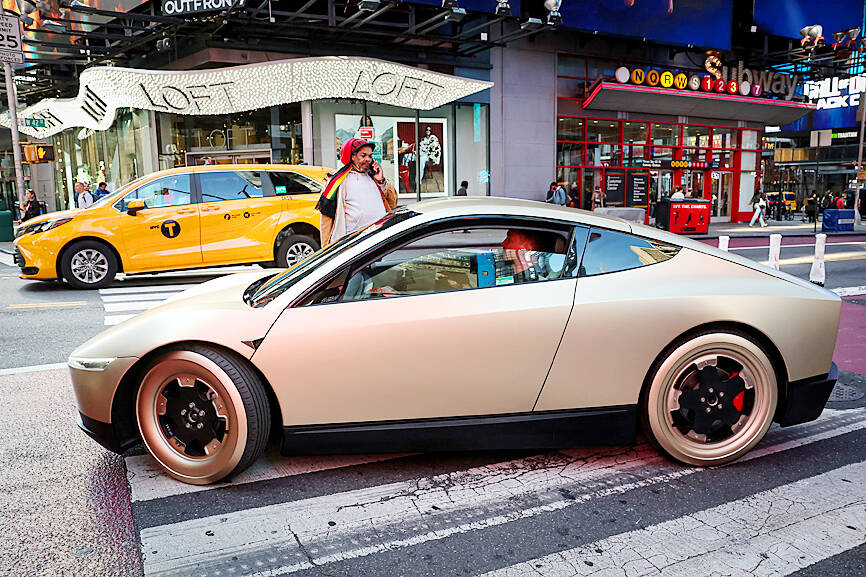Tesla Inc CEO Elon Musk won shareholder approval on Thursday for the largest corporate pay package in history, as investors endorsed his vision of morphing the electric vehicle maker into an artificial intelligence (AI) and robotics-focused company.
The proposal was approved with more than 75 percent support, and Musk bounded to the stage of the company’s annual meeting at its factory in Austin, Texas, accompanied by dancing robots.
Musk, already the world’s richest person, could get as much as US$1 trillion in stock over the next decade, although required payments would take the value down to US$878 billion.

Photo: Reuters
The vote is crucial for Tesla’s future and its valuation, which hangs on Musk’s vision of making vehicles that drive themselves, creating a robotaxi network across the US and selling humanoid robots, even though his far-right political rhetoric has hurt the Tesla brand this year.
The board warned he could leave if he did not get the pay package. While some investors said it was incredibly expensive and unnecessary, many saw it as a way to retain Musk and believe that the goals set in the package ensured shareholders would be rewarded.
“What we are about to embark upon is not merely a new chapter of the future of Tesla, but a whole new book,” Musk told a cheering group of shareholders.
He then made a string of promises on stage — from, in April, beginning production of the Cybercab, its two-passenger steering-less robotaxi, to unveiling its next-generation Roadster electric sports car. He said Tesla would need “a gigantic chip fab” to make AI chips and should work with Intel.
Shareholders re-elected three directors on Tesla’s board, voted in favor of annual elections for all board members and approved a replacement pay plan for Musk’s previous package that is held up in court.
“Other shareholder meetings are like snoozefests, but ours are bangers,” Musk said. “I mean, look at this. This is sick.”
Shareholders voted in favor of Tesla investing in Musk’s AI startup, xAI, although there were many abstentions. That could reflect the hesitancy of big investors to bless the arrangement without stronger board oversight, said Jessica McDougall, partner at strategic and governance advisory firm Longacre Square.
Many investors would be “looking for the board to provide assurances and convictions that there are guardrails in place to be sure there’s not too much mixing of businesses,” she said.
A win for Musk was widely expected, as the billionaire was allowed to vote with his roughly 15 percent stake after the automaker moved to Texas from Delaware.
Excluding Musk’s influence, the majority was small enough to warrant review of CEO pay by the board at most companies, said Jessica Strine, CEO of shareholder advisory firm Jasper Street Partners.
At Tesla, she said: “Realistically, there is not going to be such a review.”
Goals for Musk over the next decade include the company delivering 20 million vehicles, having 1 million robotaxis in operation, selling 1 million robots and earning as much as US$400 billion in core profit. However, in order for him to get paid, Tesla’s stock value has to rise in tandem, first to US$2 trillion from the current US$1.5 trillion, and all the way to US$8.5 trillion.

TEMPORARY TRUCE: China has made concessions to ease rare earth trade controls, among others, while Washington holds fire on a 100% tariff on all Chinese goods China is effectively suspending implementation of additional export controls on rare earth metals and terminating investigations targeting US companies in the semiconductor supply chain, the White House announced. The White House on Saturday issued a fact sheet outlining some details of the trade pact agreed to earlier in the week by US President Donald Trump and Chinese President Xi Jinping (習近平) that aimed to ease tensions between the world’s two largest economies. Under the deal, China is to issue general licenses valid for exports of rare earths, gallium, germanium, antimony and graphite “for the benefit of US end users and their suppliers

Dutch chipmaker Nexperia BV’s China unit yesterday said that it had established sufficient inventories of finished goods and works-in-progress, and that its supply chain remained secure and stable after its parent halted wafer supplies. The Dutch company suspended supplies of wafers to its Chinese assembly plant a week ago, calling it “a direct consequence of the local management’s recent failure to comply with the agreed contractual payment terms,” Reuters reported on Friday last week. Its China unit called Nexperia’s suspension “unilateral” and “extremely irresponsible,” adding that the Dutch parent’s claim about contractual payment was “misleading and highly deceptive,” according to a statement

The Chinese government has issued guidance requiring new data center projects that have received any state funds to only use domestically made artificial intelligence (AI) chips, two sources familiar with the matter told Reuters. In recent weeks, Chinese regulatory authorities have ordered such data centers that are less than 30 percent complete to remove all installed foreign chips, or cancel plans to purchase them, while projects in a more advanced stage would be decided on a case-by-case basis, the sources said. The move could represent one of China’s most aggressive steps yet to eliminate foreign technology from its critical infrastructure amid a

Nissan Motor Co has agreed to sell its global headquarters in Yokohama for ¥97 billion (US$630 million) to a group sponsored by Taiwanese autoparts maker Minth Group (敏實集團), as the struggling automaker seeks to shore up its financial position. The acquisition is led by a special purchase company managed by KJR Management Ltd, a Japanese real-estate unit of private equity giant KKR & Co, people familiar with the matter said. KJR said it would act as asset manager together with Mizuho Real Estate Management Co. Nissan is undergoing a broad cost-cutting campaign by eliminating jobs and shuttering plants as it grapples